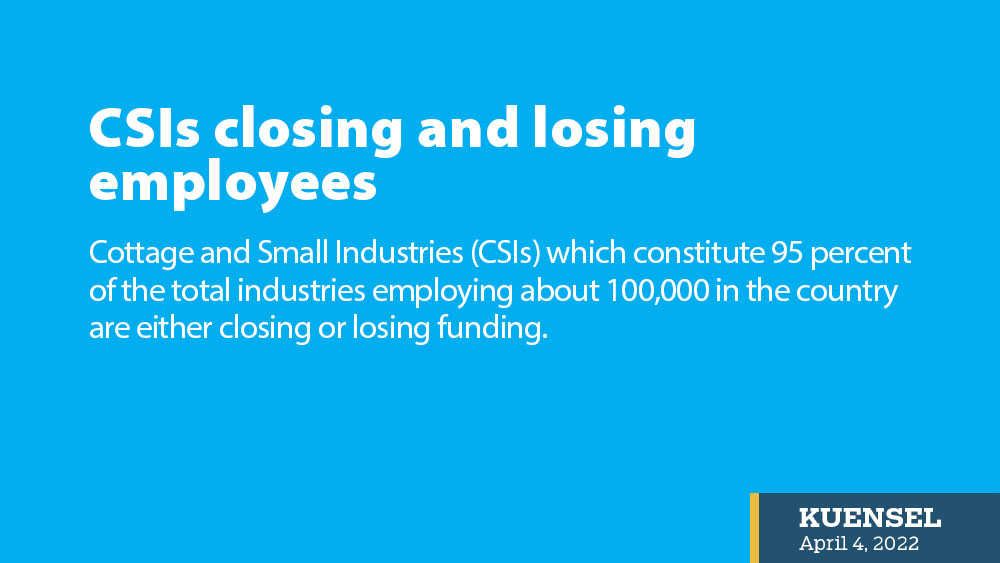Thukten Zangpo
Cottage and Small Industries (CSIs) which constitute 95 percent of the total industries employing about 100,000 in the country are either closing or losing funding.
Many promoters say a host of issues such as financial crisis, demand, supply chain problems triggered by the pandemic, and customs duty cut to 10 percent or zero have affected the businesses.
A survey by the Bhutan Association of Entrepreneurs (BAEyul), found that the number of CSIs, mostly in the production and manufacturing sector, dropped by 5 percent every year with 50 percent of the CSIs losing employees compared to pre-pandemic.
The target set in the draft 21st century economic roadmap for CSIs is to generate a gross domestic product of Nu 150 billion (20 percent of the projected GDP or Nu 800B) by 2030.
President of BAEyul, Rikesh Gurung said that the pandemic has mounted adverse shocks in the form of non-procurement of raw materials, reduced production and supply of final products, and non-availability of employees to work in the process of production.
“This has led to the loss of employment, reduction in revenue generation, declined sales, and a cut back in the income of the working class,” Rikesh Gurung said, adding that the sector requires urgent stimulus in terms of monetary and fiscal support to induce economic activity.
Bhutan Alternatives, an e-waste management project dealing with printer toner cartridge waste had 48 employees before the pandemic. Today, only 12 remain.
Founder of Bhutan Alternatives, Leki Dawa said that his more than 5,000 clients were from the government and hotel industry.
He added that the pandemic and the government’s work from the home system have affected his business.
“In the recovery plans, the government always focuses on the big sectors like construction and tourism, CSIs don’t get much attention,” Leki Dawa said.
The managing director of KP Foods based in Samtse, Amardeep Chhetri said that the pandemic compelled him to shut down and if there is no financial assistance, he will be compelled to surrender his business. He started his business with nine employees and has not operated since September 2020.
Similarly, the Founder of Lampshade, Jangchu Norbu said that earlier he could sell 20 to 30 lampshades in a month and now barely one or two are being sold. He hopes that his business will pick up as the economy improves.
The survey that comprised 65 respondents found that 89.2 percent asked for financial support (working capital, bridge loan), 20 percent said human resources, 40 percent asked for skills and training, 33.8 percent for market and platforms, and 23.1 percent for coordination and support.
Rikesh Gurung said that the popular failure of entrepreneurs is with the lack of working capital and operations (shortage of technical expertise).
“The government could provide direct financial assistance, including providing cheap bridging loans through the public banking system, or risk-sharing with private banks to expand CSI credit, or direct subsidies and grants,” he said.
One of the measures, the survey found, was a need for labour policies to help minimise job losses, ranging from wage sharing or subsidy models to job-matching initiatives.
“Our products are not able to go beyond Bhutan.” Rikesh Gurung said that the local entrepreneurs are faced with product certification.
This could be done by requiring coordination support that should include temporary relief in regulations, such as import-export requirements, or assistance from government agencies to help CSIs comply with regulations, such as CSIs health reporting during a crisis.
Rikesh Gurung also said the pandemic has caught many policymakers and CSIs by surprise and reinforced the need to raise awareness on actions needed to ensure that small businesses are more adequately prepared for future shocks.
According to the Department of Cottage and Small Industry, there were 22,328 CSIs as of June 2019. The number fell to 21,221 as of June 2021.
As of June 2020, there were 22,041 CSIs with estimated total employment of 99,288. There are only 20,000 CSIs in the country today.


